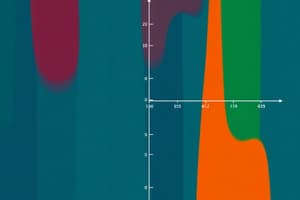Podcast
Questions and Answers
Which evaluation metric focuses on the proportion of correctly predicted positive outcomes out of all actual positives?
Which evaluation metric focuses on the proportion of correctly predicted positive outcomes out of all actual positives?
- Accuracy
- Precision
- F1 Score
- Recall (correct)
What is a primary limitation of using models that incorrectly assume linear relationships between predictors and outcomes?
What is a primary limitation of using models that incorrectly assume linear relationships between predictors and outcomes?
- Increased computational time
- Reduced model complexity
- Inaccurate predictions (correct)
- Lack of input data
What does the F1 score represent in model evaluation?
What does the F1 score represent in model evaluation?
- Harmonic mean of precision and recall (correct)
- Ratio of true positives to false positives
- Proportion of correctly classified instances
- Simple average of precision and recall
In which situation is overfitting most likely to occur?
In which situation is overfitting most likely to occur?
Which use case involves predicting the likelihood of defaulting on a loan application?
Which use case involves predicting the likelihood of defaulting on a loan application?
What type of variable does logistic regression primarily predict?
What type of variable does logistic regression primarily predict?
What is the purpose of the logit function in logistic regression?
What is the purpose of the logit function in logistic regression?
What method is commonly used to estimate coefficients in logistic regression?
What method is commonly used to estimate coefficients in logistic regression?
What does a coefficient in logistic regression signify?
What does a coefficient in logistic regression signify?
Which assumption is NOT required for logistic regression?
Which assumption is NOT required for logistic regression?
What does the odds ratio in logistic regression indicate?
What does the odds ratio in logistic regression indicate?
Which application is commonly associated with logistic regression?
Which application is commonly associated with logistic regression?
What does the term 'maximum likelihood' mean in the context of logistic regression?
What does the term 'maximum likelihood' mean in the context of logistic regression?
Flashcards
Logistic Regression
Logistic Regression
A statistical method used to predict a binary outcome (e.g., yes/no, true/false) based on a set of independent variables.
Accuracy
Accuracy
The proportion of instances correctly classified by a model.
Precision
Precision
The proportion of correctly identified positive outcomes out of all the predictions made as positive.
Recall
Recall
Signup and view all the flashcards
F1 Score
F1 Score
Signup and view all the flashcards
Dependent Variable in Logistic Regression
Dependent Variable in Logistic Regression
Signup and view all the flashcards
Independent Variables in Logistic Regression
Independent Variables in Logistic Regression
Signup and view all the flashcards
Logit Function in Logistic Regression
Logit Function in Logistic Regression
Signup and view all the flashcards
Maximum Likelihood Estimation (MLE)
Maximum Likelihood Estimation (MLE)
Signup and view all the flashcards
Log-odds (Logit)
Log-odds (Logit)
Signup and view all the flashcards
Coefficients in Logistic Regression
Coefficients in Logistic Regression
Signup and view all the flashcards
Odds Ratios in Logistic Regression
Odds Ratios in Logistic Regression
Signup and view all the flashcards
Study Notes
Introduction to Logistic Regression
- Logistic regression is a statistical method used to model the probability of a categorical dependent variable.
- It's widely used in various fields, including medicine, finance, and social sciences, to predict the probability of an event occurring.
- Unlike linear regression, which predicts a continuous variable, logistic regression predicts the probability of a binary outcome (e.g., success/failure, yes/no).
Key Concepts
- Dependent Variable: Categorical, typically binary (0 or 1).
- Independent Variables: Can be categorical or continuous, representing factors potentially influencing the outcome.
- Logit Function: A crucial component transforming the probability into a linear form. It maps the probability of an event to a value between negative and positive infinity.
Model Formulation
- The model estimates the log-odds of the dependent variable.
- The log-odds (logit) is the natural logarithm of the odds ratio, calculated as the probability of the event divided by the probability of the event not occurring.
- A linear combination of independent variables is used to predict the logit.
Model Estimation
- Maximum likelihood estimation (MLE) is the common method used to estimate the coefficients of the logistic regression model.
- MLE seeks to find the parameter values that maximize the likelihood of observing the data.
Interpretation of Results
- Coefficients: Indicate the change in the log-odds of the outcome for a one-unit change in the predictor variable, holding other predictors constant.
- Odds Ratios: Expressed as ecoefficient, directly relate to the change in odds for a unit change in the predictor variable. A large magnitude indicates a strong effect.
- Significance Levels: Report the statistical significance of each coefficient, indicating whether the relationship between predictor and outcome is likely due to chance.
Assumptions
- Independent Errors: Errors in prediction are assumed to be independent of one another.
- Linearity of Predictors: The relationship between the predictors and the log-odds must be linear. While variables could be non-linear, transforming them into a linear predictor solves this potential issue.
- Absence of Multicollinearity: Independent variables should not be highly correlated with each other.
Applications of Logistic Regression
- Predicting Customer Churn: Assessing the probability of a customer discontinuing their service.
- Medical Diagnosis: Estimating the probability of a patient having a specific disease based on symptoms.
- Financial Risk Assessment: Predicting the likelihood of default on a loan application.
- Marketing and Advertising: Understanding the likelihood of a consumer making a purchase based on various factors.
- Social Sciences: Modeling behavior, support, opinions and many others.
Evaluation Metrics
- Accuracy: Proportion of correctly classified instances.
- Precision: Proportion of correctly predicted positive outcomes out of all predicted positives.
- Recall: Proportion of correctly predicted positive outcomes out of all actual positives.
- F1 score: Harmonic mean of precision and recall, providing a balanced measure of model performance.
- ROC Curve and AUC: Used to assess the trade-off between true positive rate and false positive rate across different classification thresholds. The area under the curve (AUC) is a measure of the overall performance.
Limitations
- Assumption Violation: Results may be inaccurate if assumptions are not met; careful consideration should be given.
- Overfitting: A model can overfit the training data, leading to poor performance on unseen data. Regularization techniques help mitigate this potential issue.
- Non-linear Relationships: If relationships between predictors and outcome are non-linear, logistic regression may not effectively capture the complexity.
Studying That Suits You
Use AI to generate personalized quizzes and flashcards to suit your learning preferences.




